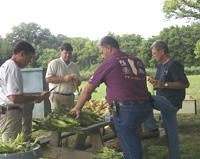Project Provides Fresh Corn for Inmates, Information for Researchers
Project Provides Fresh Corn for Inmates, Information for Researchers

Miles Hart, Henderson County Jailer, likes providing work and fresh produce for the inmates at his facility.
Through a project with the University of Kentucky College of Agriculture, Hart is able to feed fresh sweet corn to the inmates as well as provide them with some outside work.
Beside the detention center is a corn field that will provide the inmates with several meals. It takes 950 ears to feed two ears of corn at the dinner meal, Hart said. In addition to the UK corn project, the inmates tend their own garden producing fresh tomatoes, green beans, watermelon, cantaloupes, peppers and other produce for their plates.
"It is as important to have a place for the inmates to work as the fresh produce that comes from it," Hart said.
The UK project organized by the Henderson County Cooperative Extension Service Agricultural Agent, Mike Smith, is in its second year and Hart said he will participate again in 2002.
"What we are doing is looking at insect management using regular and Bt sweet corn," said Ric Bessin, UK Extension Entomologist. "The Bt corn is fully approved and has been on the market for four years. What I'm interested in is seeing if European or Southwestern corn borer are able to develop on these new varieties.
"The arrangement with the detention center works well because we have the labor to pull a large number of ears in a short period of time and search those ears for corn borers," he said. "The good news is no corn borers were found feeding on the Bt corn. But we wouldn't know that if we didn't look."
Last year, the regular sweet corn had a lot of damage, not only from corn borer but also ear worm, fall armyworm, and some Southwestern corn borer. But the Bt corn held up well. The same was proving true last week, as Bessin and his colleagues, UK Entomologists Doug Johnson and Lee Townsend, checked ears as they were brought in from the field by the inmates.
"Bt sweet corn produces high quality ears without the need for insecticide use. I took a dozen ears home last year and it was good sweet corn," Bessin said.
The project works well from everyone's standpoint, he said.
"We get the labor use. They get to have some activity here and also get the benefit of the corn as well," Bessin said. "If I did this at the university, we'd end up with a very large pile of sweet corn that groundhogs, raccoons and crows would be feeding on and most would go to waste. The nice thing here is this corn is not going to go to waste."
Another aspect of the project is that it is located in an area of Kentucky that has some of the worst corn borer problems with both Southwestern and European corn borer. Farmers have been using Bt corn to fight those insects now for several years, Bessin said.
"That's one reason why we like to look at the insects here to see if they are developing a resistance," he said.
Hart said he was approached by Mike Smith, Henderson County Extension agent for agriculture and natural resources, about participating in the project. It has worked well, he said, as he shucked an ear of corn.